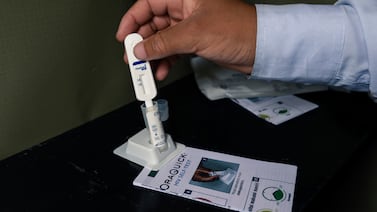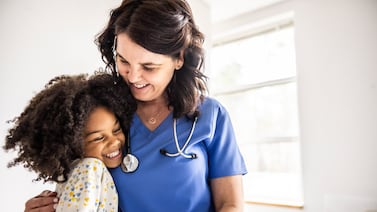Public health, explained: Sign up to receive Healthbeat’s free New York City newsletter here.
The New York State Department of Health has reported a case of measles in a Long Island child, the state’s first case confirmed outside of New York City this year.
The Health Department announced the case on Tuesday, describing the patient as a Suffolk County resident under the age of 5. The child was unvaccinated, according to the Suffolk County Department of Health Services. The announcement follows two cases of measles confirmed in infants in New York City earlier this year, bringing the state’s total number of measles cases in 2025 to three.
Measles is a highly contagious respiratory disease that is preventable through the measles-mumps-rubella (MMR) vaccine. For those who are unvaccinated, particularly children, the disease can lead to serious complications or even death.
New York’s recent measles cases have emerged amid a rapidly growing outbreak on the Texas-New Mexico border, which has resulted in two deaths. Other measles outbreaks have been reported in a dozen jurisdictions across the country this year, including in Georgia and New Jersey.
The Long Island measles patient is being treated at Cohen Children’s Medical Center in Queens, which is part of Northwell Health, according to public health officials. The state and local health departments warned the public of at least two potential public measles exposures at the hospital from the case. Members of the public who visited the hospital’s pediatric emergency department from Mar. 3 to Mar. 4, or the Medicine 3 inpatient unit from Mar. 3 to Mar. 6, may be at risk of a measles exposure. Visitors who believe they may have been exposed should contact their local health department, or reach out to their doctor or pediatrician.
The child did not attend daycare or school while infectious, and other potential exposures are being assessed, according to the local health department.
“We are actively working with public health officials under established exposure protocols to ensure no further cases arise from this incident,” Northwell Health spokesperson Joseph Kemp said in a statement. “The situation underscores the critical importance of vaccinations, including the MMR vaccine, and the need for them to help prevent diseases like measles and minimize the risk of spreading these diseases.”
Public health officials urged residents to ensure that they are up-to-date on measles vaccinations.
“Measles can be very serious. It’s much more than just a rash as complications can include pneumonia and inflammation of the brain, and often results in hospitalization,” State Health Commissioner Dr. James McDonald said in a statement. “The most important thing people can do to protect themselves is to ensure they’ve been properly immunized against measles and immediately get a shot if they are not.”
Children should receive the first dose of the MMR vaccine at 12 months of age, followed by a second dose at 4 to 5 years of age, according to the childhood immunization schedule. Two doses of the MMR vaccine are 97% effective at preventing measles.
Public health experts stress that the MMR vaccine is safe and effective. But vaccination levels in some parts of New York state have fallen below the 95% threshold of immunization coverage needed to reach herd immunity, or widespread community protection.
In Suffolk County, only 82.6% of children had received one dose of the MMR vaccine by 2 years of age as of January 1, according to data from the state Health Department.
Eliza Fawcett is a reporter covering public health in New York City for Healthbeat. Contact Eliza at efawcett@healthbeat.org.







